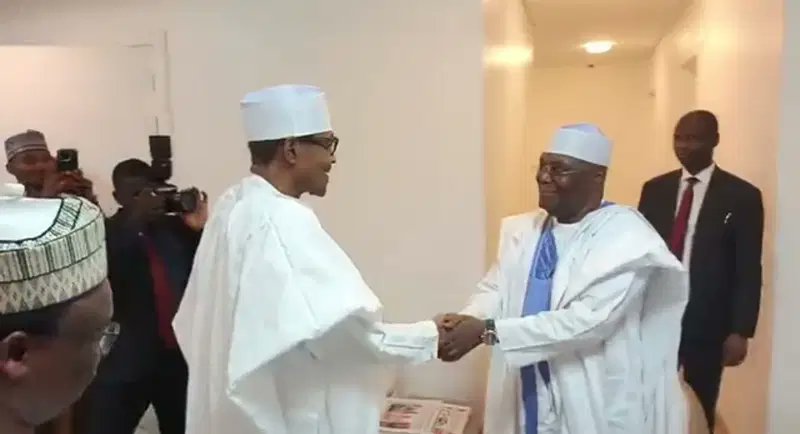A delegation of prominent Nigerian politicians, led by former presidential candidate Atiku Abubakar, paid a courtesy visit to former President Muhammadu Buhari at his Kaduna residence on Friday, following the recent Sallah celebrations. The delegation included notable figures such as Nasir El-Rufai, the former governor of Kaduna State, Aminu Tambuwal, the former governor of Sokoto State, Isa Pantami, the former Minister of Communications, Achike Udenwa, the former governor of Imo State, Senator Gabriel Suswam, the former governor of Benue State, and Jibrilla Bindow, the former governor of Adamawa State.
Atiku Abubakar, who shared details of the visit on his verified X (formerly Twitter) handle, described the encounter as a “wonderful time” spent with the former president. He highlighted Buhari’s characteristic humor, which he said left him in stitches. Notably, Atiku mentioned his role as the Waziri Adamawa, which necessitated his presence in Adamawa State during the Sallah festivities, where he represented the Lamido Fombina, the traditional ruler of Adamawa. He emphasized that the visit to Buhari was a post-Sallah courtesy call. However, the specifics of their discussions remained undisclosed.
The visit, coming shortly after the recent Sallah celebrations, holds potential significance within the Nigerian political landscape. While the exact agenda and outcomes of the meeting remain private, the gathering of such influential political figures naturally fuels speculation. It’s plausible that the discussions centered on national issues, the current political climate, and potentially, strategies for future political engagements. The presence of both ruling party and opposition figures adds another layer of intrigue, hinting at possible bridge-building efforts or behind-the-scenes negotiations.
The composition of the delegation is particularly noteworthy. It comprises individuals with diverse political backgrounds and affiliations, suggesting a broader scope to the discussions than simply internal party matters. The inclusion of former governors, ministers, and a presidential candidate points to a high-level exchange on potentially significant political issues. Furthermore, the visit occurring at Buhari’s Kaduna residence, rather than the capital Abuja, lends an air of informality, suggesting a more relaxed and potentially candid exchange.
The absence of disclosed details about the meeting’s agenda and outcomes leaves room for interpretation and speculation. It is possible that the meeting was primarily a social call, fueled by the festive spirit of Sallah. However, given the political stature of the attendees, it’s highly likely that substantive political discussions took place. The decision to keep the details private could be strategic, allowing for open and frank dialogue without the pressure of public scrutiny.
The meeting’s potential implications for the Nigerian political scene remain to be seen. It could signify a move towards greater political cooperation and consensus-building, or it could simply be a courtesy call with no significant political ramifications. Regardless, the gathering underscores the fluidity of political relationships in Nigeria and highlights the importance of behind-the-scenes engagements in shaping the country’s political landscape. Further developments and public statements from the attendees may shed more light on the meeting’s true significance in the days and weeks to come. For now, the visit remains a subject of intrigue and speculation within Nigerian political circles.














